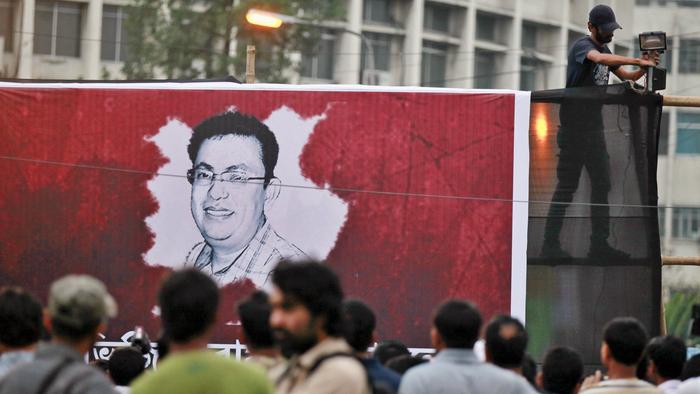Police Slammed For Failing To Prevent Avijit Roy Murder In Bangladesh
A poster displaying a portrait of Avijit Roy

NEW DELHI: The police in Bangladesh are being criticised for their role in preventing the murder of atheist writer-blogger Avijit Roy. Roy, an engineer of Bangladeshi origin, was killed by machete-wielding assailants as he and his wife -- Rafida Bonya Ahmed -- were returning from a book fair in Dhaka on February 26. The attack took place near the Teacher Student Center intersection of Dhaka University, and was claimed by Islamist outfit Ansar Bangla.
As the case remains under investigation, the country’s Law Commission on Monday noted that the “general” and “helpless” way people are being targeted in the country has compromised faith in the judicial system. Further, Justice Haque asked, “A number of policemen were standing only 15 yards from the incident. Shouldn’t they have rushed to the spot?” The Justice also reprimanded the police for failing to explain their lack of response. “The police chief has three stars on his car. Those stars are of no help to us. To us, the stars mean our brains are not battered on the streets… The police chief should have stepped down on that very day. But we do not have that culture. Not that we expect it,” the Justice said.
A similar criticism was made a few days earlier by HT Imam, political adviser to Prime Minister Sheikh Hasina. “Identify the black sheep among the force and bring them under law and justice to uphold your image,”Imam demanded. "Policemen who are not helping people, I think they are the black sheep of the service. Find and punish them. Then people's faith in police will return. Violation of human rights will also stop," Imam said in a statement directed at Shahidul Hoque, the inspector general of Bangladesh police, at a meeting in Dhaka University on the perception of police.
Roy’s wife, who suffered head injuries and lost a thumb in the attack, had initially pointed to police failure in preventing the attack. “While Avijit and I were being ruthlessly attacked, the local police stood close by and did not act,” Rafida told Reuters. Now, we demand that the Bangladeshi government do everything in its power to bring the murderers to justice.”
Roy’s father, Ajay Roy, also accused the police of negligence in the crime and said officers allowed the attackers to escape, adding that he was "not satisfied" with the investigation.
On Saturday, a court in Bangladesh allowed one suspect in the killing, Farabi Shafiur Rahman, to be remanded in custody for another five days, after being held for 10 days. Rahman denied his involvement in the killing, but praised the attackers and said that he was glad that Roy had been killed. Rahman had previously been jailed for his connection to the extremist Hizbut Tahrir terror outfit.
Roy’s killing follows a string of deaths on writers, bloggers and journalists in the country. According to the “2014 World Press Freedom Index” released by Reporters Without Borders in January this year, Bangladesh ranked a low 146 of 180 nations. Ahmed Rajib Haider, an atheist blogger was hacked to death on February 2013, by machete-wielding activists from a militant group associated with the Jamaat-e-Islami party. Haider, an architect by profession, ran a blog that was instrumental in demanding trials for the perpetrators of the mass killings during the Bangladesh Liberation War of 1971, a move that was widely seen as aimed at radical Islamists. Sagar Sarowar and Meherun Runi, two well-known married Bangladeshi journalists were stabbed to death in February 2012; the motive is still to be determined.
Another blogger, Asif Mohiuddin, was stabbed and accused of blasphemy.



